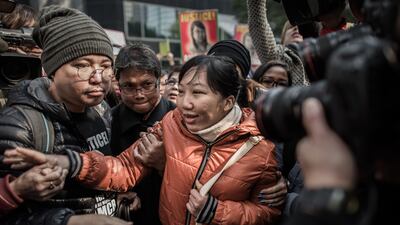HONG KONG // A Hong Kong woman was convicted on Tuesday of beating and starving her Indonesian maid, in a case that sparked international outrage and highlighted the plight of migrant domestic workers.
The verdict, read out to a packed courtroom, was met with cheers by activists and supporters of Erwiana Sulistyaningsih, a former domestic helper who has become the face of a campaign for improved workers’ rights in the financial hub.
Pictures of the injuries sustained by the 24-year-old at the hands of Law Wan-tung fuelled anger in Indonesia and shocked Hong Kong.
Ms Sulistyaningsih was admitted to hospital in her home country emaciated and in a critical condition.
“She was, for want of a better word, a prisoner in those premises,” Judge Amanda Woodcock said, referring to Ms Sulistyaningsih, who told the court she had been “tortured”.
“She was completely isolated, and [this] helps explain why this abuse could go on for so long without her retaliating or anyone knowing.”
“When Erwiana left Hong Kong she was a shadow of her former self.”
Law, 44, lowered her head but appeared to be calm when the verdict was announced.
The mother of two was found guilty of 18 of the 20 charges laid against her, including grievous bodily harm and criminal intimidation.
The only two counts she was not found guilty of were related to her treatment of another domestic worker. She had denied all the charges, and faces sentencing on February 27, with a maximum possible jail term of seven years.
A jubilant Ms Sulistyaningsih, clad in a black t-shirt with her face and the word “justice” emblazoned on it, hugged activists after the decision was handed down.
“I am very happy because I got justice from Hong Kong,” she said outside the courthouse, while thanking people for their support.
During the six-week trial, prosecutors said Law turned household items such as a mop, a ruler and a clothes hanger into “weapons” against her maids.
Ms Sulistyaningsih has described in vivid detail how she was starved, beaten and ritually humiliated by Law, with prosecutors saying she was treated as an “unpaid slave”.
“It’s a victory for Erwiana,” an ecstatic Aaron Ceradoy, from the Asia Pacific Mission for Migrants, said.
“It would be good if the migrant community can use this case to strengthen their position on their demands for changes in policies.”
The case sparked protests by migrant workers in Hong Kong, and has thrust the plight of migrant domestic helpers in Asia and the Middle East into the headlines after shocking incidents of torture and even killings.
Hong Kong is home to nearly 300,000 maids from mainly South-east Asian countries – predominantly Indonesia and the Philippines – and criticism from rights groups over their treatment is growing.
* Agence France-Presse

